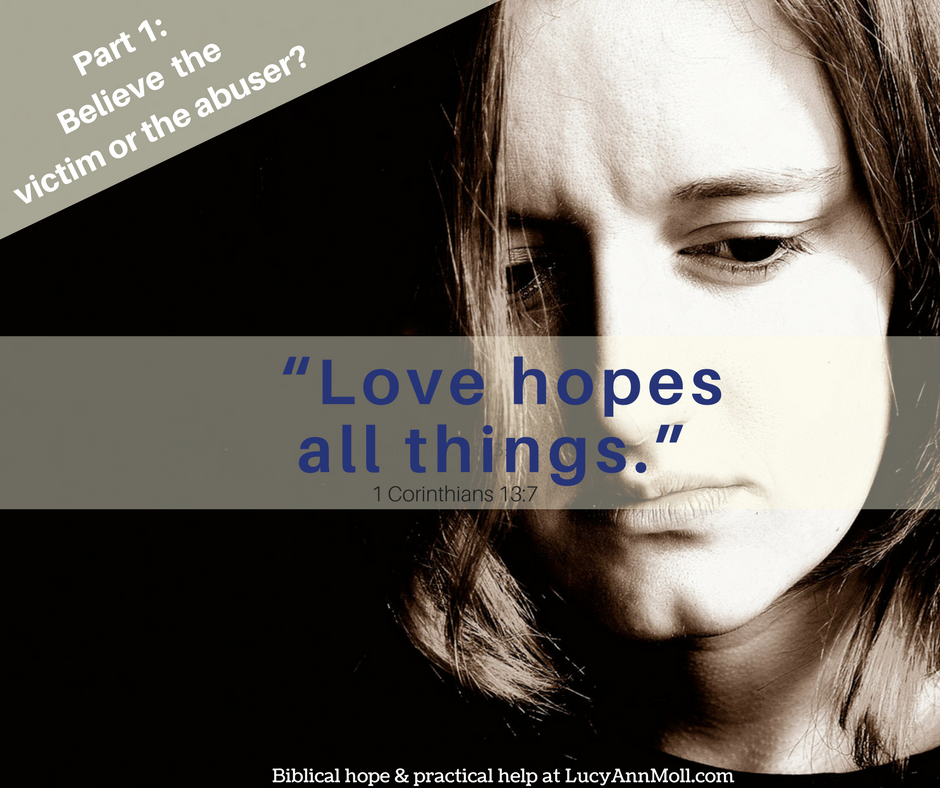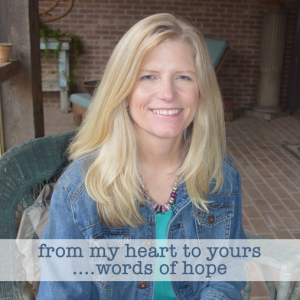by Lucy | May 4, 2017 | biblical counseling, emotions, relationships

An abuse victim needs loving support from friends and spiritual leaders. In this multi-part series, guest writer Jim Newheiser recognizes a pendulum swing in addressing this very difficult problem. And he provides balance. Read on and let me know: Do you agree with him? Disagree? Please leave a comment or contact me.
This is part 1 in a multi-part series, which appeared first here at the Biblical Counseling Coalition, and is reprinted with permission.

I am thankful to God that many necessary and important books and articles are being written to increase awareness of physical and sexual abuse as they affect both the society at large and the Christian community in particular. Spiritual leaders have been rightly admonished for their failure to protect at-risk women and children.[1]
Abuses which should have been exposed have been covered up, leading to more unnecessary suffering which grieves Christ.
Battered wives have been wrongly told that if they were just more loving and submissive, their husbands would change and the abuse would stop.
They are then wrongly sent back to take further verbal and physical beatings.
Click & Tweet!
Many church leaders need to repent of their failure to “rescue the weak and needy; [and] deliver them out of the hand of the wicked” (Psalm 82:4).
While I affirm the importance of understanding the dark nature of abuse and protecting the victims of abuse, I am concerned that some, in their zeal to correct the failure of the past, have swung too far the other way. This can lead to false accusations and unnecessary family breakups. I would like to give a few examples of what I believe to be common overstatements, and for each one, I will describe the good intention behind the statements, the harm which can be caused because of imbalanced thinking, and a more balanced way of expressing the same concerns.
Always Believe the Victim?
ASSERTION: Always believe the victim.
- The valid concern: This statement is made out of sympathy for many victims of abuse whose claims have been rejected as unbelievable when no one could imagine that the perpetrator, who seems like such a nice guy, could have done such a bad thing. Or those hearing the claim may prefer not to get involved in the messiness which will surely follow if the claim is substantiated.
- The harm that can be caused: Innocent people have been harmed by false claims of abuse. Some alleged victims have learned how much harm they can do to another person with an accusation of abuse. I had a counseling case in which a fifteen-year-old girl threatened that she would falsely accuse her stepfather of molesting her if he didn’t give her what she wanted. We had another case in which an alleged victim had someone else scratch up her face so that she could call the police and accuse an innocent party of doing it. To be falsely labeled as an abuser can destroy a person’s reputation, damage his career, and potentially lead to false imprisonment. The Bible teaches that a high standard of proof is necessary before we can treat someone as guilty (Deut. 19:15).
- A better way to say this would be: All claims of abuse must be taken seriously.
Click & Tweet!
When hearing an allegation of abuse, we should immediately offer compassionate care, ensuring that the threatened party is safe. Allegations need to be investigated, in many cases by the civil authorities (Romans 13:1-7); however, it is not biblical to treat the accused party as guilty without proof.
Let every person be subject to the governing authorities. For there is no authority except from God, and those that exist have been instituted by God.
Therefore whoever resists the authorities resists what God has appointed, and those who resist will incur judgment.
For rulers are not a terror to good conduct, but to bad. Would you have no fear of the one who is in authority? Then do what is good, and you will receive his approval, for he is God’s servant for your good. But if you do wrong, be afraid, for he does not bear the sword in vain. For he is the servant of God, an avenger who carries out God’s wrath on the wrongdoer. (Romans 13:1-4. ESV)
[1] Because most cases of abuse involve women I will refer to the victim as being female. I acknowledge that men can also be victims of spousal abuse and have counseled men in such situations.
Sharing Hope with Your Heart,

by Lucy | May 2, 2017 | biblical counseling, emotions, relationships
 Authority figures–whether fathers, husbands, church elders, government leaders, or employers–influence women’s lives. How we women respond to them reveals our hearts. This article by counselor Julie Ganschow appeared first here on her website and is used with permission.
Authority figures–whether fathers, husbands, church elders, government leaders, or employers–influence women’s lives. How we women respond to them reveals our hearts. This article by counselor Julie Ganschow appeared first here on her website and is used with permission.

When Authority Figures Disappoint Us
As Christian women, we function in a world that is watching to see how we will respond to the authority figures in our lives. Fathers, husbands, and church elders are the main authorities under which we function. Sometimes our leaders disappoint us, don’t respond the way we want them to, or even do things that are extremely hurtful to us.
Women who respond to authority with anger and rebellion are often applauded in larger social circles or on social media. Our female friends and acquaintances don’t want to see us get pushed around or “abused.” As as result, they bandwagon with the offended/hurt woman and jump to her defense.
This is very unwise.
Proverbs 18:13 says,
He who gives an answer before he hears, it is folly and shame to him. (NASB)
Often, those defending a woman who has been hurt do not have the full story. They speak out in support of her without knowing the facts of the situation.
Unless you can have access to the other party involved, be very careful about coming to conclusions. It is very easy to take up a reproach on behalf of someone you care about or when the cause is important to you for personal reasons.
I see this a lot when a woman is claiming that she has been harmed in some way by her church leaders or by her husband. Typically, there are so many factors involved in such situations that unless you have access to all persons involved you cannot possibly know the complexity of the matter.
Questions to Ask Before Responding
To keep from being a fool, ask a number of questions (who, what, when, where, and how) and seek to understand the problem.
Click & Tweet!
Verse 17 tells us,
The first to plead his case seems right, until another comes and examines him. (NASB)
It is imperative that you learn both sides of the issue before taking a position in support of the woman. It is easy to form a wrong conclusion about something without having all the facts. Perhaps you have been in this position, and learned too late that you spoke or acted prematurely on behalf of someone. It is much wiser to take your time and learn the background and pertinent information about the issue and the people involved before you say or do something that will bring shame upon you later on.
While asking questions, it is important that you listen to what is being said in response. This is why Proverbs 18:15 says,
The mind of the prudent acquires [gets] knowledge and the ear of the wise seeks knowledge [information]. (NASB emphasis added)
You want to be actively seeking to learn information about the problem and the person who is in the middle of the problem. Listening is much more than merely hearing what is being said. This is active listening; the kind that is engaged in hearing and processing what the speaker is saying. In addition, the listener is discerning the heart issues being revealed as she talks (Luke 6:45). Again, asking clarifying questions will help you to gain an understanding of the problem.
Ministering with Understanding
When you are confident you have a good grasp on the problem, then you can proceed with ministering to the heart of the woman. It may very well be that she has been wronged; how she responds to it will either bring glory or shame to the name of Christ. Our responsibility is to help her form a biblical response to those who have hurt her.
1 Peter 2:18-23 is a wonderful passage to begin teaching her what will honor God. Remind her that Jesus completely understands suffering under an unjust authority and that He is with her in her suffering (Hebrews 2:18; 4:15). Show her the pattern He left for us to follow: when He was reviled he did not revile in return; when He suffered, He did not threaten, but entrusted Himself to Him to judges justly (1 Peter 2:23).
No one is saying this will be easy, and she may balk at your counsel. You may have to be persistent, helping her to see the issues of her heart as revealed by her words and deeds (Luke 6:45).
The goal is always repentance and restoration before God. It may not be wise for her to return to the situation (physical abuse, spiritual abuse), but there should be peace between the parties if at all possible (Romans 12:18). This is what glorifies God.
Sharing Hope with Your Heart,

by Lucy | Mar 9, 2017 | biblical counseling, emotions, relationships
 Emotional abuse destroys a marriage. Sometimes it leads to physical abuse. Today’s guest blogger is Lilly Park, an assistant professor of biblical counseling at Crossroads Bible College in Indianapolis, IN, provides hope an help to wives. This article (Responding to Emotional Abuse in Marriage) first appeart on the Biblical Counseling Coalition website and is used with permission.
Emotional abuse destroys a marriage. Sometimes it leads to physical abuse. Today’s guest blogger is Lilly Park, an assistant professor of biblical counseling at Crossroads Bible College in Indianapolis, IN, provides hope an help to wives. This article (Responding to Emotional Abuse in Marriage) first appeart on the Biblical Counseling Coalition website and is used with permission.

This post is dedicated to the women I’ve met who have inspired me by their faith and strength in the midst of painful marriages.
Good Marriages, Broken Marriages
I’ve seen marriages that reflect Christ and the Church: husbands lovingly leading their homes and wives lovingly submitting to their husbands. How good (and hope-filled!) it is to see real life examples, especially at a time when marriages are being attacked from pornography, homosexuality, and cohabitation. I’ve also seen broken marriages and emotionally abusive relationships, which has taught me a lot about faith.
The women I’ve met believed in submitting to their husbands and tried to do so. At some point, however, they began to change negatively without knowing it. They isolated themselves. They questioned themselves. They started to make excuses for their husbands’ sins.
Some might say that you should continue to submit to his leadership, pray for him, and trust God. Is it acceptable to seek help and possibly even separate, if necessary? When I think of marriage, “protection” is one of the concepts that comes to mind. Perhaps that’s why emotional abuse, or any kind of abuse for that matter, in marriage saddens me in a different way.
My desire is that God might use this blog post to encourage those who are weary, to challenge those who are not trusting God or seeking counsel, and to provide some help to those who are not sure how to help women in emotionally abusive relationships. I’ve also met men who have been abused by their wives, so I certainly do not believe that only women are abused.
Bible Doesn’t Label ‘Emotional Abuse’
The Bible doesn’t use the label “emotional abuse,” but it does prohibit it.
First, we are not to curse people who have been created in the image of God (James 3:9).
Second, emotional abuse violates the two greatest commandments: love God and love others as yourself (Matthew 22:35-40).
Third, emotional abuse violates God’s design for marriage where the husband lovingly leads and the wife lovingly submits (Ephesians 5:21-33).
Fourth, it violates Christian living by denying yourself (Mark 8:34) and speaking wholesome words (Ephesians 4:29).
Fifth, it displays pride and a lack of fear of God, which leads to destruction (Proverbs 16:18). A husband who commits emotional abuse deceives himself to be a king who deserves glory, honor, and praise.
Sixth, emotional abuse is betrayal to God and people by trying to be like God and deceiving others.
Nature of Emotional Abuse
A common term found in the definition of emotional abuse is control. Emotional abuse occurs when someone tries to control you through actions or words. They might not physically hurt you, but they know how to instill fear through intimidation and manipulation.
If emotions are produced by your evaluations or perceptions,[1] then emotional abuse involves hurting how you view yourself and others. Over time, you negatively view yourself. You might question yourself, blame yourself, or not see the severity of the situation. You become a weary person, trying to please your husband’s unreasonable demands but rarely is he pleased.
Click & Tweet!
The women I’ve met endured emotional abuse for years and no one knew about it. They didn’t even know until they finally talked to someone. (Of course, the same could happen with physical abuse.) Emotional abuse is unacceptable and sinful. It is slowly killing a person. It is also not the same as occasional arguments in marriage; it occurs frequently.
Common Themes in Emotional Abuse
Anger. Emotionally abusive anger is a sin (Colossians 3:8). In this case, it reveals a desire for control. For example, a husband sends texts or calls throughout the day from work and gets angry if the wife responds too slowly. Or, he gets angry if she disagrees with him.
Manipulation/hypocrisy. This sin is revealed in different ways:
- The husband is a different person in front of a church leader and others. He knows how to blame the wife.
- The husband starts crying in the counseling session and convinces the pastor or friends. Then, everything that the wife had shared in the past carries little weight. After all, he cried. The wife trusts people even less.
- The husband meets with other family and friends to win them over.
Fear/Threats. In some cases, this involves finances or child custody if the couple is in the process of a divorce.
Blameshifting/Denial. “If you did what I told you to do, then I wouldn’t have been angry.” “When did I say that to you?”
Isolation. The wife spends less time with family and friends because her husband does not want to see them or another argument happened.
Minimizing the problem. The husband says that the wife is exaggerating. Sometimes, the wife minimizes the problem. Another instance is when the person trying to help is deceived or doesn’t know how to help. “Every marriage has problems.” “Both the husband and wife have issues.”
In-laws. Leaving and cleaving never happened in the marriage. The in-laws are the leaders in the marriage, not the husband. The in-laws believe that their son is perfect or they see their son’s faults but place the blame on his wife.
What to Do For the Wife
It is not uncommon for emotional abuse to lead to physical abuse, so seek counseling as soon as possible. We might think that emotional abuse would not happen in Christian marriages. I’ve seen cases where the husband was a church leader.
Don’t keep it private. You think that your spouse will change or won’t get angry again if you’re more obedient. Be careful of such thinking. In a way, it deceives you to think that you’re in control of the situation.
Find someone who will believe you. Sometimes, church leaders are deceived or don’t want to get involved in messy problems. Don’t give up until you find a godly person who knows how to help.
Biblical submission. This is not obedience at all costs. Yes, wives are to submit to their husbands, but not to sin or sinful treatment.
Click & Tweet!
Prayer. Pray for the spouse’s repentance. If the spouse is not saved, pray for his salvation. Pray that God would protect your heart from anger and bitterness.
Trust God. It is so hurtful when family or friends don’t believe you or desert you, but God knows the truth. You can rest in His care and know that vengeance belongs to Him.
Remember God’s character. He is faithful. He is all-knowing. He will never desert you.
Be Wise When Helping a Hurting Wife
If someone shares about any kind of abuse with you, know that a lot of courage and trust were involved. Be careful of shattering it! Most likely, this person is vulnerable and fearful. As I often tell people, good intentions are not enough. I’ve seen friends get involved by meeting with the husband and then they are left more confused.
Watch out for complaining and gossip. Use wisdom in determining how much the person should share with you. In the end, our effort to minister shouldn’t have enabled a venting session, but a return to God’s perspective session, which gives hope and honors God.
One woman said to me: “If God allowed this pain to happen so that my husband might know Christ, then it was worth it.” She also recognized that God used the trial to draw her closer to Him. At that moment, this person who never completed college taught me about faith in a way that I didn’t learn from books and lectures.
It’s easier to submit to a loving leader in the home, but to love a husband who constantly questions you, belittles you, and lies to you is a powerful display of faith in God.
Join the Conversation
What additional biblical counsel would you give to an emotionally abused wife?
[1]Brian Borgman, Feelings and Faith (Wheaton, IL: Crossway Books, 2009), 26.
Resources for YOU!
COUNSELING: Are you or a friend in an emotionally abusive relationship? May we encourage you to seek help from a trustworthy person at your church or from a biblical counselor? Please contact me, and I’ll give you hope and get you in touch with help.
DOWNLOAD: Here’s a helpful reminder of who you are in Christ. Go here to get it.
Sharing Hope with Your Heart,

by Lucy | Mar 31, 2016 | biblical counseling, emotions |

If you have a dark secret, you probably are more like a turtle than a fancy show dog. Fancy show dogs lap up attention. Turtles hide. They are afraid. They like to blend in. Their hard shells protect them, or do they?
Through my childhood and into my 20s, I was all turtle. I tried to hide my dark secrets. The problem is, I acted out — quietly, for turtles are quiet — in ways that hinted at the pain I covered up, retracting my feet and head into my shell, my hiding place. Where is you favorite hiding place when you hurt? A book? TV? Wine? In the arms of a lover? Church?
In this blog post I’ll share:
- Some of my own dark secrets.
- How God healed my shame.
- Do this. Don’t do that.
My Shameful Secret
When you meet a turtle, you can bet they’ve been hurt. . .by parents or kids at school or a tragedy of some sort. Show dogs often have hurts too. They hide in other ways. One way is pointing you to their accomplishments. Another way is making jokes. Are you more like a turtle or a show dog?
Here are several of my secrets that turtle-ized me.
- Depression from childhood to my early 30s.
- A child of divorce. . .three times. My parents divorced twice, once when I was age 8, they remarried a year later, and divorced again in my mid 20s. My dad remarried and divorced.
- Sexual abuse survivor. I repressed the memories for nearly 20 years.
- Drug abuse. I drove drunk. I drove high. This happened in high school. I’m not proud of it. I was stupid.
- Self-harm. I went through a stage in high school where dug my fingernails into my wrists and drew blood.
- Binge eating followed by starving in college, yelled at myself — “pig, pig” — and ate more then punished myself by eating nothing for one or two days.
- Perfectionism. I thought I was lovable only when I did everything right. But I couldn’t, so I hated myself.
Yes, there’s more. I’ve learned to share only secrets where I now have healing and am open to talk about freely. What about you? Do you have secrets? Are you careful to share it with trustworthy people? Have you shared a secret with someone who betrayed your confidence? Didn’t their betrayal hurt worse than having a house drop on your head?
How God Healed My Shame
 The turning point for this turtle was God-ordained. I wouldn’t have chosen it. In his wisdom, God picked the time and day. He knew I’d find safety in him and my husband.
The turning point for this turtle was God-ordained. I wouldn’t have chosen it. In his wisdom, God picked the time and day. He knew I’d find safety in him and my husband.
A Saturday morning in the summer, I woke up, bawling. My poor husband thought I was in physical pain. I wasn’t. Memories from my childhood and teen years flooded me unexpectedly and I cried a Mississippi River. I had pushed down some of these memories for decades. I knew they were true. I had chosen to pretend.
Three important decisions I made that day:
- Share my deepest secret with a counselor.
- Start journaling my thoughts and feelings.
- Sing to Christian music every day.
Sharing my secret freed me from holding it in holding it in holding it in. To get it out, I first shared it in third person, but my counselor and I both knew I was talking about my secret–sexual molestation by a family member. After I shared with the counselor, I told my secret to my husband. He asked me why I had never told him. I said — and I meant it — that it had never crossed my mind. What a turtle I was!
Journaling provided a safe place to write where it hurt. Singing to solid Christian music filled with biblical truth helped renew my mind according to the Bible. I am thankful to God that he gave me the time to journal and sing, and people to confide in.
In you, Lord, I have taken refuge; let me never be put to shame (Psalm 71:1, NIV).
Do This, Don’t Do That
Keeping a dark secret hurts you and others. Sharing them with a safe Christian friend or gospel-centered counselor heals. Here are a few do’s and don’ts for healing if you or a friend has a dark secret.
DO pray and ask God for healing.
DON’T pretend the dark secret is no biggie.
DO read the Psalms. David and other psalmists pour out their heart as they wrestle with hurts and hard emotions.
DON’T distract yourself day after day with food, TV, computer games, porn, or alcohol.
DO journal your thoughts and feelings.
DON’T “vomit” your secret on anyone and everyone or all over the Internet.
DO get the help God wants you to have.
Friend, God loves you just as you are. You don’t have to have it all figured out. It’s okay to be messy. We’re all sinners, right? And in Christ, you and I are saints! Hold dear to your identity in Christ.
In Christ, you are set free from condemnation and shame.
Therefore, there is now no condemnation for those who are in Christ Jesus. (Romans 8:1)
In Christ, you are able to live victoriously.
But thanks be to God, who gives us the victory through our Lord Jesus Christ. (1 Corinthians 15:57)
OFFER: I encourage you to sign up for a complimentary 15-minute consult to find out if biblical counseling is for you. To sign up, send me a contact message. We can pick a time that works for you. Thank you.
Sharing hope with your heart,

by Lucy | Mar 7, 2013 | biblical counseling, biblical counseling, emotions |
 Wouldn’t it be terrific to mend your broken heart?
Wouldn’t it be terrific to mend your broken heart?
Today debuts the first of eight posts in the blog series, “Mending a Broken Heart.” My prayer is you’ll find hope and healing as we talk together about tough stuff like abuse and divorce and addiction and the death of loved ones. Please join me every Tuesday and Thursday for my “Mending a Broken Heart” posts.
In a moment you’ll hear from my guest blogger, Kc Christman Hutter, author of A Broken Heart.
First. . .
How We Met, Why I Care
Kc and I crossed paths online and became fast friends. She sent me her memoir.
It’s fresh, this voice, this wise voice. Her Facebook photo belies the fact she grew up in the age of black-and-white photos and record players, her heart broken and searching for peace–physical, mental, and emotional.
Isn’t it reassuring to know you’re not alone in your pain? Having a fellow traveler helps, wouldn’t you agree?
Here’s a link to read more about A Broken Heart, even get your own copy. I highly recommend it. Four stars.
Who of us has not been broken?
Who of us has not cried out in desperation for relief? for hope?
Here’s a brief excerpt from “A Broken Heart.” You’ll meet the precious red-headed girl with the green tin suitcase, all grown up and running from an abuser. I added three application questions at the end.

Anthony was a tall Italian with curly, coal black hair–and a master’s degree. I’ve always admired people with college degrees. His degree could have been story telling. Fact or fiction, he wove spellbinding words together. We became lovers.
When Honeywell hired him to work in Colorado Springs, he, asked, “Would you consider moving with me?” On one knee he added, “Marry me.”
Head over heels in love, I moved with my two sons from Minot, North Dakota, to Teeter Tottter Circle in the shadow of Pikes Peak. Little did I realize our house on Teeter Totter would live up to its name. . ..
Sunny Mornings, Dark Nights
Sunny mornings and then dark nights played out like a movie of passion and deceit. I found bottles of whiskey stashed all over the house. Six months after the move, I became the sole bread winner. After a year, I had no illusions or hope that the situation would improve.
While my two sons were in school and Anthony on the golf course, I hired a moving truck. I took my stuff, the boys’ stuff, and left his stuff–including his wet bar. We went into hiding in a condo on the other side of town.
Thank you, Jesus, for finding me a refuge away from verbal and physical abuse. No stale booze odor in our home.
Two weeks later, our quiet was shattered. Anthony had followed one of my sons home from school. Knocking at the door, Anthony said, “I want a second chance. Why did you leave me? I love you. I’m sorry. Move back.”
“No!” I replied.
He grabbed me. My blouse tore. The boys and I fled to the safety of a motel. Days later, I called my neighbor. They told me Anthony left my condo escorted by the police.
Police!
Walking into my home, it was hard to comprehend the destruction: broken whiskey bottles on the floor; brown stains on the carpet; telephone ripped from the wall and used as a hammer; pieces of glass from broken picture frames shattered on my bed; dots of his blood spattered on the walls; plants overturned and left wilting, dying; jewelry ripped apart; treasured heirlooms gone.
“We called the police because of all the racket,” my neighbor said. . ..
A gnawing gut feeling told me: Call Uncle Gay and Aunt Lou in North Dakota. They were now in their golden years.
Hearing my voice, they started crying. They asked, “Are you all right? Anthony called and told us you were kidnapped and placed in a prostitution ring in Chicago.”
 About Kc and New Life
About Kc and New Life
Kc was brought up in the church but did not have a personal relationship with Jesus until after her second divorce. She told the Lord in prayer, weeping and clutching her uncle’s Bible: “I’ve made such a mess of my life doing it my may. I forgot how much you love me. Forgive me.” God gave her the strength to pen a memoir and the hope to guide those who are hurting and without hope to the Mender of Broken Hearts.
Kc is married and lives in Washington State. She is the mother of two adult sons, one of whom died of cancer and is now with the Lord, and a grandmother.
A Few Questions
1. What warning signs early in their relationship signaled that Anthony may be abusive?
2. Name some pros and cons of leaving a man like Anthony?
3. Isn’t it reassuring to learn that God hates abuse? Why do you think he allows abuse to happen when he hates it?
Hope for You
My eyes are ever on the LORD, for only he will release my feet from the snare.
Turn to me and be gracious to me, for I am lonely and afflicted.
Relieve the troubles of my heart and free me from my anguish.
Guard my life and rescue me; do not let me be put to shame, for I take refuge in you. (Psalm 25:15-17, 20)
Sign up to receive my hope-filled posts and receive a free eBook. Easy, simple.




 Authority figures–whether fathers, husbands, church elders, government leaders, or employers–influence women’s lives. How we women respond to them reveals our hearts. This article by counselor
Authority figures–whether fathers, husbands, church elders, government leaders, or employers–influence women’s lives. How we women respond to them reveals our hearts. This article by counselor 
 Emotional abuse destroys a marriage. Sometimes it leads to physical abuse. Today’s guest blogger is Lilly Park, an assistant professor of biblical counseling at
Emotional abuse destroys a marriage. Sometimes it leads to physical abuse. Today’s guest blogger is Lilly Park, an assistant professor of biblical counseling at 

 Wouldn’t it be terrific to mend your broken heart?
Wouldn’t it be terrific to mend your broken heart?


